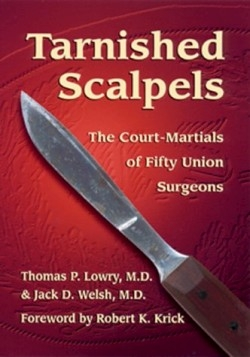Tarnished Scalpels
The Court-Martials of Fifty Union Surgeons
During the Civil War, the Union Army held approximately 80,000 court-martials, at least 249 involving medical personnel. In Tarnished Scalpels, Lowry and Welsh concentrate on the court-martials of fifty Union surgeons who had been brought up on charges ranging from failure to perform their duty to misuse of hospital food. “The stories also once again teach us that the war had little to do with dashing cavaliers, gallant commanders, plumed hats, and noble sentiments-and much to do with grief, pain, pus, shattered bones, diarrhea, and death.”
During the war, doctors were often forced to construct makeshift hospitals in the midst of battles and deal with the confusion of overcrowded conditions. They could only request needed food and medicine, but often had to do without them. Many court-martials involved shortages of medicine, food, and blankets that were beyond a doctor’s control. Also, since many doctors were new to military life, they ran afoul of unfamiliar military regulations. “The Civil War doctor seems to have been expected to perform miracles, not just in the face of disaster but in an uphill fight against his own army and its bureaucracy.”
Luther G. Thomas was accused of “failing to provide his patients with food, medicine, shelter, and medical attention,” during the battle of Fredericksburg. Line officers described Thomas as ill-tempered and neglectful of the wounded, while the medical staff described him as concerned for the patients’ comfort and medical needs. The court believed the line officers and seemed to expect—as the authors point out—that a surgeon with only three months experience and no administrative support could handle such a chaotic situation. Perkins Gordon was accused of misusing the hospital food supply (military personnel of higher rank were required to purchase their own food). Neither the evidence that Gordon had paid for medical supplies and food for soldiers out of his own pocket, nor that he ate the hospital’s fruit to cure his own scurvy, moved the court.
Both Lowry and Welsh’s medical expertise greatly serve to explain obscure practices from an earlier time. The authors remind us that doctors from that time period should not be judged by today’s standards. “Our Civil War doctor did not think of bacteria because no one thought of bacteria. He did not strive for a sterile operating field because that concept would not arrive for another twenty years.” Tarnished Scalpels is a fine addition to the history of the Civil War period, both well researched and written in an accessible style.
Reviewed by
Ronald D. Lankford, Jr.
Disclosure: This article is not an endorsement, but a review. The publisher of this book provided free copies of the book to have their book reviewed by a professional reviewer. No fee was paid by the publisher for this review. Foreword Reviews only recommends books that we love. Foreword Magazine, Inc. is disclosing this in accordance with the Federal Trade Commission’s 16 CFR, Part 255.

